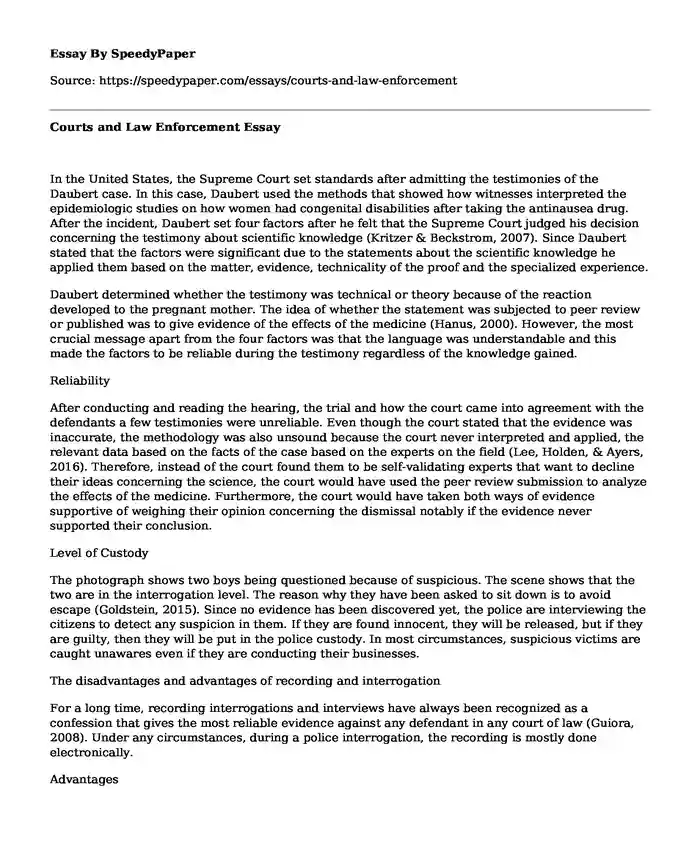
| Type of paper: | Course work |
| Categories: | Management Finance Society |
| Pages: | 3 |
| Wordcount: | 767 words |
In the United States, the Supreme Court set standards after admitting the testimonies of the Daubert case. In this case, Daubert used the methods that showed how witnesses interpreted the epidemiologic studies on how women had congenital disabilities after taking the antinausea drug. After the incident, Daubert set four factors after he felt that the Supreme Court judged his decision concerning the testimony about scientific knowledge (Kritzer & Beckstrom, 2007). Since Daubert stated that the factors were significant due to the statements about the scientific knowledge he applied them based on the matter, evidence, technicality of the proof and the specialized experience.
Daubert determined whether the testimony was technical or theory because of the reaction developed to the pregnant mother. The idea of whether the statement was subjected to peer review or published was to give evidence of the effects of the medicine (Hanus, 2000). However, the most crucial message apart from the four factors was that the language was understandable and this made the factors to be reliable during the testimony regardless of the knowledge gained.
Reliability
After conducting and reading the hearing, the trial and how the court came into agreement with the defendants a few testimonies were unreliable. Even though the court stated that the evidence was inaccurate, the methodology was also unsound because the court never interpreted and applied, the relevant data based on the facts of the case based on the experts on the field (Lee, Holden, & Ayers, 2016). Therefore, instead of the court found them to be self-validating experts that want to decline their ideas concerning the science, the court would have used the peer review submission to analyze the effects of the medicine. Furthermore, the court would have taken both ways of evidence supportive of weighing their opinion concerning the dismissal notably if the evidence never supported their conclusion.
Level of Custody
The photograph shows two boys being questioned because of suspicious. The scene shows that the two are in the interrogation level. The reason why they have been asked to sit down is to avoid escape (Goldstein, 2015). Since no evidence has been discovered yet, the police are interviewing the citizens to detect any suspicion in them. If they are found innocent, they will be released, but if they are guilty, then they will be put in the police custody. In most circumstances, suspicious victims are caught unawares even if they are conducting their businesses.
The disadvantages and advantages of recording and interrogation
For a long time, recording interrogations and interviews have always been recognized as a confession that gives the most reliable evidence against any defendant in any court of law (Guiora, 2008). Under any circumstances, during a police interrogation, the recording is mostly done electronically.
Advantages
Ideally, during an interview, audio recording usually gives an accurate summary because despite capturing all the answers, the comments made by the researcher are also saved for reference (Brown, 2010). The best part about this method is that the evidence can be reminded severally and the speed of the speech, as well as the pitch of the voice, can be assessed. The recorded interviews can also be assessed while answering questions that are relevant in the research report.
Disadvantages
One disadvantage of audio recording is that the interviewer depends on the recording equipment (Winer, 2017). This means that if it fails to function as required, then there is no backup plan. To overcome such challenges of equipment failure, it is vital to check it before and prepare to take essential points during the interview. Since audio recording may not be reliable, video recording will be critical.
References
Brown, P. (2010). Fundamentals of Audio and Acoustics. Audio Engineering Explained- for Professional Audio Recording, 5-25. doi:10.1016/b978-0-240-81273-1.00001-3
Guiora, A. N. (2008). Interrogation Methods and the Eighth Amendment. Constitutional Limits on Coercive Interrogation, 129-140. doi:10.1093/acprof:oso/9780195340310.003.0008
Hanus, J. (2000). Listing of State Courts Using Federal Rule 702 and Daubert Standard. The Forensic Evaluation of Traumatic Brain Injury, 33-76. doi: 10.1201/9781420039382.axc
Kritzer, H. M., & Beckstrom, D. C. (2007). Daubert in the States: Diffusion of a New Approach to Expert Evidence in the Courts. Journal of Empirical Legal Studies, 4(4), 983-1006. doi:10.1111/j.1740-1461.2007. 00112.x
Goldstein, M. L. (2015). Best Interest Factors in Child Custody Evaluations. Handbook of Child Custody, 11-15. doi:10.1007/978-3-319-13942-5_2
Lee, S., Holden, D., & Ayers, S. (2016). How women with high risk pregnancies use lay information when considering the place of birth: A qualitative study. Women and Birth, 29(1). doi: 10.1016/j.wombi.2015.07.010
Schuhmann, K. (2000). Listing of State Courts Using Federal Rule 702 and Daubert Standard. The Forensic Evaluation of Traumatic Brain Injury, 227-236. doi: 10.1201/9781420039382.axc
Winer, E. (2017). Recording Devices and Methods. The Audio Expert, 171-209. doi:10.4324/9781315223162-8
Cite this page
Courts and Law Enforcement. (2022, Dec 16). Retrieved from https://speedypaper.net/essays/courts-and-law-enforcement
Request Removal
If you are the original author of this essay and no longer wish to have it published on the SpeedyPaper website, please click below to request its removal:
- Free Essay with News Analysis
- Free Example of Sources Assessment Paper: Discrimination of The Latino Community in the US
- My Parents: My Guardians and Backbone of Success.
- Essay Example on Family Dissension in Glass Menagerie and Everyday Use
- Essay Sample on Youssef Chahine: A Literature Review of the Iconic Film Director
- Free Essay. The Ethics of Anthropology and Archaeology
- Free Essay: Case Analysis Exercise
Popular categories




